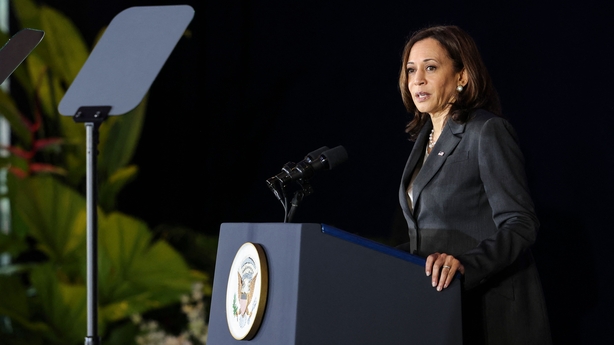US Vice President Kamala Harris has accused China of intimidation in hotly disputed waters as she sought to rally Asian allies against China and shore up US credibility in the wake of the chaotic withdrawal from Afghanistan.
Her comments in Singapore came as the United States seeks to reset relations in Asia after the turbulent Donald Trump era and build a bulwark against the rising might of China.
But her trip to the region, which also includes a stop in Vietnam, comes as Washington faces fresh questions over its dependability amid the US pullout from Afghanistan and Taliban takeover.
In a speech laying out her administration's foreign policy goals, Ms Harris reiterated that Washington had "enduring commitments" in Asia - and took aim at China.
"Beijing continues to coerce, to intimidate and to make claims to the vast majority of the South China Sea," she said.
"Beijing's actions continue to undermine the rules-based order and threaten the sovereignty of nations.
"The United States stands with our allies and partners in the face of these threats."
In response, China accused the US of hiding behind rhetoric of a rules-based global order to defend its own "bullying, hegemonic behaviour".
"In order to defend 'America first', the US can arbitrarily smear, suppress, coerce and bully other countries without paying any price.
"This is the order the US wants ... But who will believe them now?" foreign ministry spokesman Wang Wenbin said, citing the US pullout from Afghanistan as an example of Washington's "selfish" foreign policy.
China claims almost all of the resource-rich sea, through which trillions of dollars in shipping trade passes annually, with competing claims from four Southeast Asian states as well as Taiwan.
The Chinese government has been accused of deploying a range of military hardware including anti-ship and surface-to-air missiles there, and ignored a 2016 international tribunal decision that declared its historical claim over most of the waters to be without basis.
Tension has escalated in recent months between China and rival claimants.
Manila was angered after hundreds of Chinese boats were spotted inside the Philippines' Exclusive Economic Zone, while Malaysia scrambled fighter jets to intercept Chinese military aircraft that appeared off its coast.
Ms Harris also sought to allay fears that growing US-China tension could force countries who have strong ties with both of the world's top economies to choose sides.
"Our engagement in southeast Asia and the Indo-Pacific is not against any one country, nor is it designed to make anyone choose between countries," she said.

Ms Harris is the latest top official from President Joe Biden's administration to visit the region. On a trip to Singapore last month, Pentagon chief Lloyd Austin also strongly criticised China's maritime claims.
But the Afghan crisis and doubts about US credibility are casting a long shadow over Ms Harris's visit.
In today's speech, she defended Mr Biden's decision to push ahead with the US pullout from Afghanistan as "courageous and right" and reiterated US officials were "laser-focused" on the chaotic evacuation from Kabul airport.
"The United States has been focused on safely evacuating American citizens, international partners, Afghans who worked side by side with us, and other Afghans at risk," she said.
Ms Harris also announced that Washington was offering to host the annual meetings of the Asia-Pacific Economic Cooperation (APEC) forum in 2023, a grouping that includes Beijing and the US.
The US-China relationship has deteriorated over a range of issues from cybersecurity and tech supremacy to human rights in Hong Kong and Xinjiang.
Singapore and the US have long enjoyed strong ties, and the city-state is the anchor of the US naval presence in southeast Asia.
The vice president will hold talks later today with business leaders in Singapore on supply chain issues, including the global microchip shortage, before heading to Hanoi.
She has been criticised for heading to Vietnam amid the Afghan evacuation, which has prompted comparisons with the trauma of 1975 in Saigon, when US helicopters ferried final evacuees from the embassy roof.

